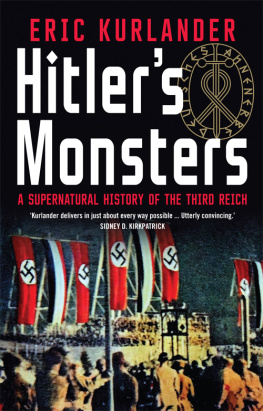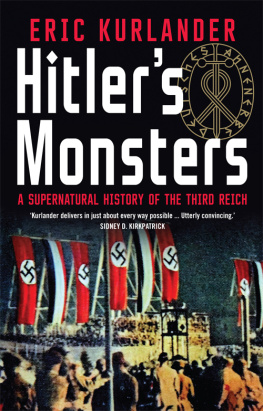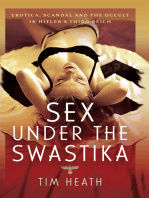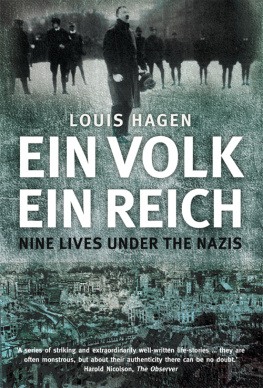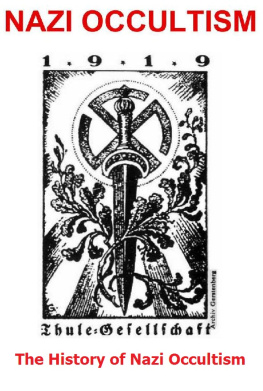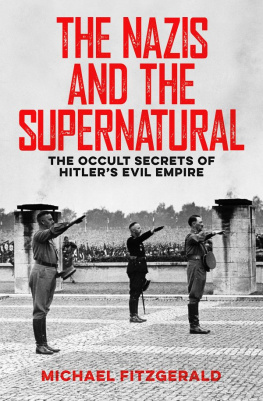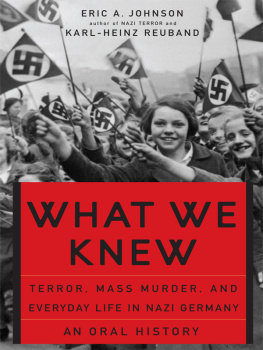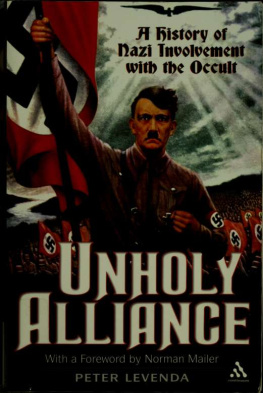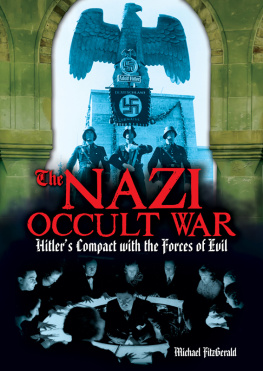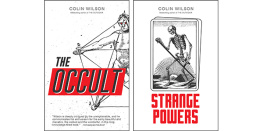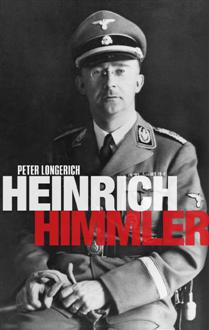HITLERS MONSTERS

Copyright 2017 Eric Kurlander
All rights reserved. This book may not be reproduced in whole or in part, in any form (beyond that copying permitted by Sections 107 and 108 of the U.S. Copyright Law and except by reviewers for the public press) without written permission from the publishers.
For information about this and other Yale University Press publications, please contact:
U.S. Office:
Europe Office:
Set in Minion Pro by IDSUK (DataConnection) Ltd
Printed in Great Britain by Gomer Press, Llandysul, Ceredigion, Wales
Library of Congress Cataloging-in-Publication Data
Names: Kurlander, Eric, 1973- author.
Title: Hitler's monsters : a supernatural history of the Third Reich / Eric Kurlander.
Description: New Haven : Yale University Press, 2017.
Identifiers: LCCN 2017005559 | ISBN 9780300189452 (hardback)
Subjects: LCSH: GermanyPolitics and government19331945. | SupernaturalPolitical aspectsGermanyHistory20th century. | OccultismPolitical aspectsGermanyHistory20th century. | PaganismPolitical aspectsGermanyHistory20th century. | SuperstitionPolitical aspectsGermanyHistory20th century. | National socialism and occultismHistory. | Religion and politicsGermanyHistory20th century. | Political cultureGermanyHistory20th century. | Popular cultureGermanyHistory20th century. | GermanySocial conditions19331945. | BISAC: HISTORY / Europe / Germany. | BODY, MIND & SPIRIT / Occultism. | HISTORY / Military / World War II. | HISTORY / Modern / 20th Century.
Classification: LCC DD256.7 .K87 2017 | DDC 943.086dc23
LC record available at https://lccn.loc.gov/2017005559
A catalogue record for this book is available from the British Library.
10 9 8 7 6 5 4 3 2 1
CONTENTS
ACKNOWLEDGEMENTS
In the eight years I have worked on this book, I have incurred the debt of a great many people and institutions. My research and writing was supported by a 2012 Fulbright Scholar Fellowship, a 2012 Teaching Exchange with the Freiburg Pdagogische Hochschule, four Stetson University Summer Research Grants (2009, 2012, 2013, 2015) and a Spring 2015 Stetson Sabbatical Award. I am extraordinarily grateful to the CIES and the Stetson University Professional Development Committee for this support. Without the expertise and assistance of the outstanding archivists and staff at the German Federal Archives in Berlin, Koblenz, and Freiburg, I could never have assembled the archival research for this book. The same debt of gratitude applies to the staff at the Institute for Contemporary History in Munich and the Institute for Frontier Areas of Psychology and Mental Health in Freiburg.
I am grateful to the wonderful libraries at the University of Cologne, where I conducted much of the preliminary research for this project, and the University of Freiburg, where I spent a semester as a visiting scholar in Spring 2012. Equally valuable was the Berlin State Library (Staatsbibliothek zu Berlin, Stiftung Preussischer Kulturbesitz). The exceptional collections at all three institutions provided most of the published primary and secondary sources on which this book is based. I would also like to thank the faculty and staff of the Stetson University Library, notably Barbara Costello and Susan Derryberry, who helped track down and obtain obscure sources online or through interlibrary loan.
A number of of fellow scholars made the research and writing of this book possible. The incomparable David Blackbourn and Geoff Eley supported this project, as they have my earlier projects, with dedication and enthusiasm, as did my Stetson colleagues Grady Ballenger, Paul Croce, Karen Ryan, and Margaret Venzke. I am very grateful to the scholars who invited me to panels, conferences, and colloquia in Germany and the United States, where I was able to present aspects of this project from its earliest stages to the final chapters. These include Jason Coy, Norbert Finzsch, Bryan Ganaway, Geoffrey Giles, Bernd Grewe, Thomas Pegelow Kaplan, Thomas Lekan, Johannes Mueller, Sylvia Paletschek, Heather Perry, and Richard Wetzell. There are many colleagues who provided helpful feedback on early drafts of chapters, articles, or presentations that I gave in Germany and the United States. These include, but are not limited to, Ofer Ashkenazi, Benita Blessing, Erik Butler, Joel Davis, Michael Fahlbusch, Jamil Khader, Samuel Koehne, Fabian Link, Emily Mieras, Nicole Mottier, Perry Myers, Barry Murnane, Clyde Kurlander, Michele Kurlander, Peter Staudenmaier, Anthony Steinhof, Julia Torrie, Jared Poley, Andrew Port, and George Williamson.
I would also like to thank my co-editors Monica Black, Joanne Miyang Cho, and Douglas McGetchin for collaborating on two edited collections that helped me think through my research, meet like-minded scholars, and develop the arguments put forth in this book. I would like to give special thanks to the late Nicholas Goodrick-Clarke, Peter Fritzsche, Richard Steigmann-Gall, and three other anonymous reviewers for their thorough read of the initial proposal, as well as the finished manuscript. Their helpful suggestions have made this a far better book.
I would be remiss were I not to mention my outstanding editors at Yale University Press, starting with Heather McCallum, who remains one of the most supportive and enthusiastic editors with whom I have worked. Her steady investment in the project, from conception to fruition, was indispensable in making this book happen. I am likewise grateful to Melissa Bond, Samantha Cross, and Rachael Lonsdale for their expertise and assistance. In particular, I want to thank my fantastic copy-editor, Richard Mason, who not only exercised the normal due diligence in finding incomplete references and stylistic errors, but also made a number of helpful editorial suggestions as well.
I would like to express my gratitude to the Stetson History Departments administrative assistants over the past six years, notably Mary Bernard, Jennifer Snyder Hildebrandt, and Chelsea Santoro, for their logistical and editorial support at many stages of the project. Notably, they supervised the efforts of our work-study students in tracking down books and articles, compiling a preliminary bibliography, and performing a number of other helpful tasks. These students include Jesika Butler, John Dieck, Maria Frank, Marissa Hanley, Josh Howard, Katie Nathensen, Andrei Pemberton, and Brett Whitmore. Last but not least, I want to thank my student research assistants, Drew Glasnovich, Noah Katz, Justin McCallister, William Proper, Alex (Matthew) Rafferty, Julie Stevens, and Tabea Wanninger, who helped cull, organize, and analyze hundreds of pages of primary and secondary sources.
Finally, I would like to thank my children, Amlie and Kolya. They have cheerfully accompanied my wife Monika and me to Germany on a half dozen occasions over the past eight years attending school there for a semester in order to make the research and writing of this book possible. I dedicate this book to them.
INTRODUCTION
The success of National Socialism, the unique appearance of the Fhrer, has no precedent in German History ... The consequence of these historic and unprecedented political occurrences is that many Germans, due to their proclivity for the romantic and the mystical, indeed the occult, came to understand the success of National Socialism in this fashion.
Alfred Rosenberg, 1941
Horror always lurks at the bottom of the magical world and everything holy is always mixed with horror.
From a page underscored by Hitler in Ernst Schertels occult work, Magic: History, Theory, and Practice (1923)
Outside a purely secular frame of reference, Nazism [is] felt to be the embodiment of evil in a modern twentieth-century regime, a monstrous pagan relapse in the Christian community of Europe.
Next page
